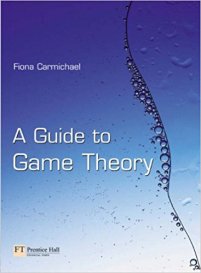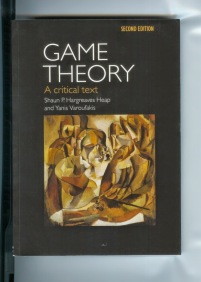From Lars Syll Back in 1991, when yours truly earned his first PhD with a dissertation on decision making and rationality in social choice theory and game theory, I concluded that “repeatedly it seems as though mathematical tractability and elegance — rather than realism and relevance — have been the most applied guidelines for the behavioural assumptions being made. On a political and social level, it is doubtful if the methodological individualism, ahistoricity and formalism is building on is especially valid.” This, of course, was like swearing in church. My mainstream colleagues were — to say the least — not exactly überjoyed. For those of you who are not familiar with game theory, but are eager to learn something relevant about it, I have three suggestions: Start with the best
Topics:
Lars Pålsson Syll considers the following as important: Uncategorized
This could be interesting, too:
tom writes The Ukraine war and Europe’s deepening march of folly
Stavros Mavroudeas writes CfP of Marxist Macroeconomic Modelling workgroup – 18th WAPE Forum, Istanbul August 6-8, 2025
Lars Pålsson Syll writes The pretence-of-knowledge syndrome
Dean Baker writes Crypto and Donald Trump’s strategic baseball card reserve
from Lars Syll
Back in 1991, when yours truly earned his first PhD with a dissertation on decision making and rationality in social choice theory and game theory, I concluded that “repeatedly it seems as though mathematical tractability and elegance — rather than realism and relevance — have been the most applied guidelines for the behavioural assumptions being made. On a political and social level, it is doubtful if the methodological individualism, ahistoricity and formalism is building on is especially valid.”
This, of course, was like swearing in church. My mainstream colleagues were — to say the least — not exactly überjoyed.
For those of you who are not familiar with game theory, but are eager to learn something relevant about it, I have three suggestions:
Start with the best introduction there is

then go on to read more on the objections that can be raised against game theory and its underlying assumptions, e.g. ‘rationality,’ ‘backward induction’ and ‘common knowledge’ in

and then finish off with what one of the world’s most renowned game theorists — Ariel Rubinstein — has to say on the — rather limited — applicability of game theory in this interview (emphasis added):
What are the applications of game theory for real life?
That’s a central question …
In game theory, what we’re doing is saying, “Let’s try to abstract our thinking about strategic situations.” Game theorists are very good at abstracting some very complicated situations and putting some elements of the situations into a formal model. In general, my view about formal models is that a model is a fable. Game theory is about a collection of fables. Are fables useful or not? In some sense, you can say that they are useful, because good fables can give you some new insight into the world and allow you to think about a situation differently. But fables are not useful in the sense of giving you advice about what to do tomorrow, or how to reach an agreement between the West and Iran. The same is true about game theory …
In general, I would say there were too many claims made by game theoreticians about its relevance. Every book of game theory starts with “Game theory is very relevant to everything that you can imagine, and probably many things that you can’t imagine.” In my opinion that’s just a marketing device.
Why do it then?
What I’m opposing is the approach that says, in a practical situation, “OK, there are some very clever game theoreticians in the world, let’s ask them what to do.” I have not seen, in all my life, a single example where a game theorist could give advice, based on the theory, which was more useful than that of the layman …
Looking at the flipside, was there ever a situation in which you were pleasantly surprised at what game theory was able to deliver?
None. Not only none, but my point would be that categorically game theory cannot do it.
Game theory is, like mainstream economics in general, model-oriented. There are many reasons for this – the history of the discipline, having ideals coming from the natural sciences (especially physics), the search for universality (explaining as much as possible with as little as possible), rigour, precision, etc. Most mainstream economists and game theorists want to explain social phenomena, structures and patterns, based on the assumption that the agents are acting in an optimizing (rational) way to satisfy given, stable and well-defined goals.
Building their economic models, modern mainstream economists ground their models on a set of core assumptions describing the agents as ‘rational’ actors and a set of auxiliary assumptions. Based on these two sets of assumptions, they try to explain and predict both individual and social phenomena.
The model used is typically seen as a kind of thought experimental ‘as if’ benchmark device for enabling a rigorous mathematically tractable illustration of social interaction in an ideal-type model world, and to be able to compare that ‘ideal’ with reality. The ‘interpreted’ model is supposed to supply analytical and explanatory power, enabling us to detect and
understand mechanisms and tendencies in what happens around us in real economies.
However, if the models are to be relevant, we also have to argue that their precision and rigour still hold when they are applied to real-world situations. They often do not. When addressing real economies, the idealizations and abstractions necessary for the deductivist machinery to work simply do not hold. If the real world is fuzzy, vague and indeterminate, then why should our models build upon a desire to describe it as precise and predictable? Being told that the model is rigorous and amenable to ‘successive approximations’ to reality is of little avail, especially when the law-like (nomological) core assumptions are highly
questionable and extremely difficult to test.
Many mainstream economists – still – think that game theory is useful and can be applied to real life and give important and interesting results. That, however, is a rather unsubstantiated view. What game theory does is, strictly seen, nothing more than investigate the logic of behaviour among non-existant robot-imitations of humans. Knowing how those ‘rational fools’ play games does not help us to decide and act when interacting with real people. Knowing some game theory may actually make us behave in a way that hurts both ourselves and others. Decision-making and social interaction are always embedded in socio-cultural contexts. Not taking account of that, game theory will remain an analytical cul-de-sac that never will be able to come up with useful and relevant explanations.
Over-emphasizing the reach of instrumental rationality and abstracting away from the influence of many known to be important factors, reduces the analysis to a pure thought experiment without any substantial connection to reality. Limiting theoretical economic analysis in this way – not incorporating both motivational and institutional factors when trying to explain human behaviour – makes economics insensitive to social facts.
Game theorists extensively exploit ‘rational choice’ assumptions in their explanations. That is probably also the reason why game theory has not been able to accommodate well-known anomalies in its theoretical framework. That should hardly come as a surprise to anyone. Game theory with its axiomatic view of individuals’ tastes, beliefs, and preferences, cannot accommodate very much of real-life behaviour. It is hard to find really compelling arguments in favour of us continuing down its barren paths since individuals obviously do not comply with, or are guided by game theory.
Apart from a few notable exceptions, it is difficult to find really successful applications of game theory. Why? To a large extent simply because the boundary conditions of game theoretical models are false and baseless from a real-world perspective. And, perhaps even more importantly, since they are not even close to being good approximations of real life, game theory lacks predictive power. This should come as no surprise. As long as game theory sticks to its ‘rational choice’ foundations, there is not much to be hoped for.
Applications of game theory have on the whole resulted in massive predictive failures. People simply do not act according to the theory. They do not know or possess the assumed probabilities, utilities, beliefs or information to calculate the different (‘subgame,’ ‘trembling hand perfect’) Nash equilibria. They may be reasonable and make use of their given cognitive faculties as well as they can, but they are obviously not those perfect and costless hyper-rational expected utility maximizing calculators game theory posits. And fortunately so. Being ‘reasonable’ makes them avoid all those made-up ‘rationality’ traps that game theory would have put them in if they had tried to act as consistent players in a game theoretical sense.
Game theorists can, of course, marginally modify their toolbox and fiddle with the auxiliary assumptions to get whatever outcome they want. But as long as the ‘rational choice’ core assumptions are left intact, it seems a pointless effort to hamper an already excessive deductive-axiomatic formalism. If you do believe in the real-world relevance of game theoretical ‘science fiction’ assumptions such as expected utility, ‘common knowledge,’ ‘backward induction,’ correct and consistent beliefs etc., etc., then adding things like ‘framing,’ ‘cognitive bias,’ and different kinds of heuristics, do not ‘solve’ any problem. If we want to construct a theory that can provide us with explanations of individual cognition, decisions, and social interaction, we have to look for something else.
